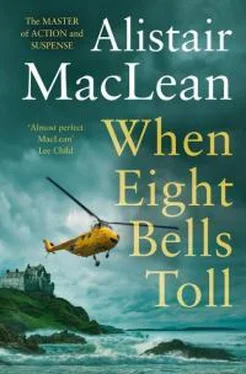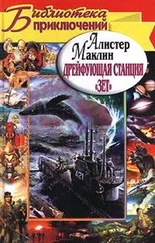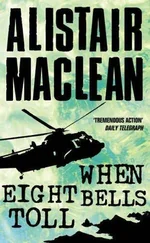‘During the night the Nantesville turned out west into the Atlantic. We thought we had lost her. We think we know now why she turned out: she wanted to arrive at a certain place at a certain state of the tide in the hours of darkness, and she had time to kill. She went west, we believe, firstly because it was the easiest way to ride out the westerly gale and, secondly, because she didn’t want to be seen hanging around the coast all of the next day and preferred to make a direct approach from the sea as darkness was falling.
‘The weather moderated a fair way overnight. Calvert left Crinan at dawn, almost at the very minute the Nantesville turned back east again. Radio transmissions were still coming in from Baker and Delmont exactly on schedule. The last transmission came at 1022 hours that morning: after that, nothing.’
Uncle Arthur stopped and the cheroot glowed fiercely in the darkness. He could have made a fortune contracting out to the cargo shipping companies as a one-man fumigating service. Then he went on very quickly as if he didn’t like what he had to say next, and I’m sure he didn’t.
‘We don’t know what happened. They may have betrayed themselves by some careless action. I don’t think so, they were too good for that. Some member of the prize crew may just have stumbled over their hiding-place. Again it’s unlikely, and a man who stumbled over Baker and Delmont wouldn’t be doing any more stumbling for some time to come. Calvert thinks, and I agree with him, that by the one unpredictable chance in ten thousand, the prize crew’s radio-operator happened to be traversing Baker and Delmont’s wave-band at the very moment they were sending their fifteen second transmission. At that range he’d about have his head blasted off and the rest was inevitable.
‘A plot of the Nantesville’s fixes between dawn and the last transmission showed her course as 082° true. Predicted destination – Loch Houron. Estimated time of arrival – sunset. Calvert had less than a third of the Nantesville’s distance to cover. But he didn’t take the Firecrest into Loch Houron because he was pretty sure that Captain Imrie would recognise a radio beacon transmitter when he saw one and would assume that we had his course. Calvert was also pretty sure that if the Nantesville elected to continue on that course – and he had a hunch that it would – any craft found in the entrance to Loch Houron would receive pretty short shrift, either by being run down or sunk by gunfire. So he parked the Firecrest in Torbay and was skulking around the entrance to Loch Houron in a frogman’s suit and with a motorised rubber dinghy when the Nantesville turned up. He went aboard in darkness. The name was changed, the flag was changed, one mast was missing and the superstructure had been repainted. But it was the Nantesville.
‘Next day Calvert and Hunslett were stormbound in Torbay but on Wednesday Calvert organised an air search for the Nantesville or some place where she might have been hidden. He made a mistake. He considered it extremely unlikely that the Nantesville would still be in Loch Houron because Imrie knew that we knew that he had been headed there and therefore would not stay there indefinitely, because the chart showed Loch Houron as being the last place in Scotland where anyone in their sane minds would consider hiding a vessel and because, after Calvert had left the Nantesville that evening, she’d got under way and started to move out to Carrara Point. Calvert thought she’d just stayed in Loch Houron till it was dark enough to pass undetected down the Sound of Torbay or round the south of Torbay Island to the mainland. So he concentrated most of his search on the mainland and on the Sound of Torbay and Torbay itself. He thinks now the Nantesville is in Loch Houron. We’re going there to find out.’ His cheroot glowed again. ‘And that’s it, my dear. Now, with your permission, I’d like to spend an hour on the saloon settee. Those nocturnal escapades.’ He sighed, and finished: ‘I’m not a boy any longer. I need my sleep.’
I liked that. I wasn’t a boy any longer either and I didn’t seem to have slept for months. Uncle Arthur, I knew, always went to bed on the stroke of midnight and the poor man had already lost fifteen minutes. But I didn’t see what I could do about it. One of my few remaining ambitions in life was to reach pensionable age and I couldn’t make a better start than by ensuring that Uncle Arthur never laid hands on the wheel of the Firecrest.
‘But surely that’s not it,’ Charlotte protested. ‘That’s not all of it. Mr Hunslett, where’s Mr Hunslett? And you said Mr Calvert was aboard the Nantesville. How on earth did he–?’
‘There are some things you are better not knowing, my dear. Why distress yourself unnecessarily? Just leave this to us.’
‘You haven’t had a good look at me recently, have you. Sir Arthur?’ she asked quietly.
‘I don’t understand.’
‘It may have escaped your attention but I’m not a child any more. I’m not even young any more. Please don’t treat me as a juvenile. And if you want to get to that settee to-night–’
‘Very well. If you insist. The violence, I’m afraid, has not all been one-sided. Calvert, as I said, was about the Nantesville. He found my two operatives, Baker and Delmont.’ Uncle Arthur had the impersonal emotionless voice of a man checking his laundry list. ‘Both men had been stabbed to death. This evening the pilot of Calvert’s helicopter was killed when the machine was shot down in the Sound of Torbay. An hour after that Hunslett was murdered. Calvert found him in the Firecrest’s engine-room with a broken neck.’
Uncle Arthur’s cheroot glowed and faded at least half a dozen times before Charlotte spoke. The shake was back in her voice. ‘They are fiends. Fiends.’ A long pause, then: ‘How can you cope with people like that?’
Uncle Arthur puffed a bit more then said candidly: ‘I don’t intend to try. You don’t find generals slugging it out hand-to-hand in the trenches. Calvert will cope with them. Good night, my dear.’
He pushed off. I didn’t contradict him. But I knew that Calvert couldn’t cope with them. Not any more, he couldn’t. Calvert had to have help. With a crew consisting of a myopic boss and a girl who, every time I looked at her, listened to her or thought of her, started the warning bells clanging away furiously in the back of my head, Calvert had to have a great deal of help. And he had to have it fast.
After Uncle Arthur had retired, Charlotte and I stood in silence in the darkened wheelhouse. But a companionable silence. You can always tell. The rain drummed on the wheelhouse roof. It was as dark as it ever becomes at sea and the patches of white fog were increasing in density and number. Because of them I had cut down to half speed and with the loss of steerage way and that heavy westerly sea corning up dead astern. I’d normally have been hard put to it to control the direction of the Firecrest : but I had the auto-pilot on and switched to ‘Fine’ and we were doing famously. The auto-pilot was a much better helmsman than I was. And streets ahead of Uncle Arthur.
Charlotte said suddenly: ‘What is it you intend to do to-night?’
‘You are a gourmand for information. Don’t you know that Uncle Arthur – sorry. Sir Arthur – and I are engaged upon a highly secret mission? Security is all.’
‘And now you’re laughing at me – and forgetting I’m along on this secret mission too.’
‘I’m glad you’re along and I’m not laughing at you, because I’ll be leaving this boat once or twice to-night and I have to have somebody I can trust to look after it when I’m away.’
Читать дальше
Конец ознакомительного отрывка
Купить книгу









